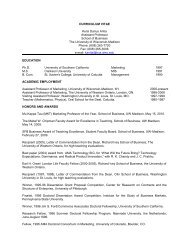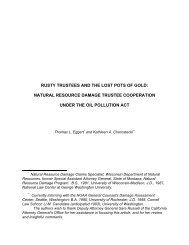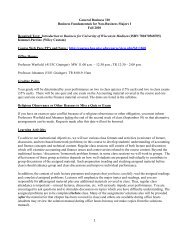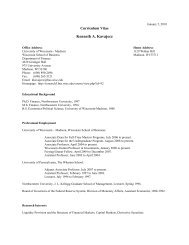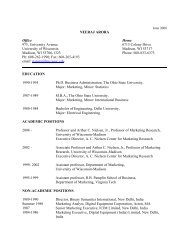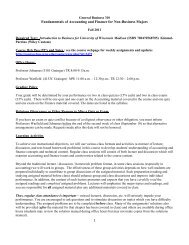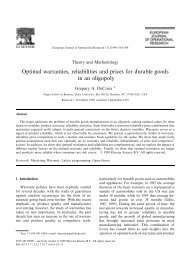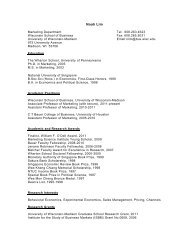family legacies - Wisconsin School of Business - University of ...
family legacies - Wisconsin School of Business - University of ...
family legacies - Wisconsin School of Business - University of ...
Create successful ePaper yourself
Turn your PDF publications into a flip-book with our unique Google optimized e-Paper software.
Family Legacies<br />
The participants in our study embraced <strong>family</strong> <strong>legacies</strong> far more than they rejected them,<br />
again reflecting cultural values. Emerging adults embraced <strong>family</strong> <strong>legacies</strong> into their individual<br />
identities by enacting them in their daily lives. In several instances, participants’ responses to<br />
their <strong>family</strong> <strong>legacies</strong> were ambivalent, suggesting we embrace them because they are uniquely<br />
ours, even though as individuals we may not agree or like them. People also tend to reject most<br />
negative <strong>legacies</strong>. This may be because, as Stone (1988) suggested, individuals do not want these<br />
negative <strong>legacies</strong> to become part <strong>of</strong> their individual identity. This may also be due to selective<br />
remembering, focusing on positive themes or stories. Third generation <strong>family</strong> members in this<br />
study rejected negative <strong>legacies</strong> by choosing not to enact them, enacting alternative <strong>legacies</strong>, or<br />
contradicting the legacy.<br />
Our research adds to narrative inquiry by illustrating how <strong>legacies</strong> are embraced and<br />
rejected on a continuum. Moreover, this process is contextual, as the <strong>legacies</strong> within a <strong>family</strong><br />
demonstrate how individuals conduct themselves in various situations. Narrators tell stories in<br />
highly selective ways which depends on changing situations and social expectations; narratives<br />
are always context dependent (Archakis & Tzanne, 2005). In some cases, participants only<br />
rejected <strong>legacies</strong> in certain instances. This finding highlights the idea that individuals can be<br />
selective in their responses to the <strong>legacies</strong> and that their responses can be contradictory (Archakis<br />
& Tzanne, 2005; May, 2004). Further, the possibility exists that individuals can embrace a<br />
<strong>family</strong> legacy but not extend it, or reject a <strong>family</strong> legacy but still pass on its meaning to future<br />
generations. In essence, individuals learn from experience when to enact certain <strong>legacies</strong>,<br />
depending on the situation and the relationships with the people involved. We speculate that<br />
when <strong>family</strong> <strong>legacies</strong> are adopted at the individual level, it is necessary to modify them in order<br />
to better reflect one’s individual identity. Thus, it seems that third generation <strong>family</strong> members do<br />
35



